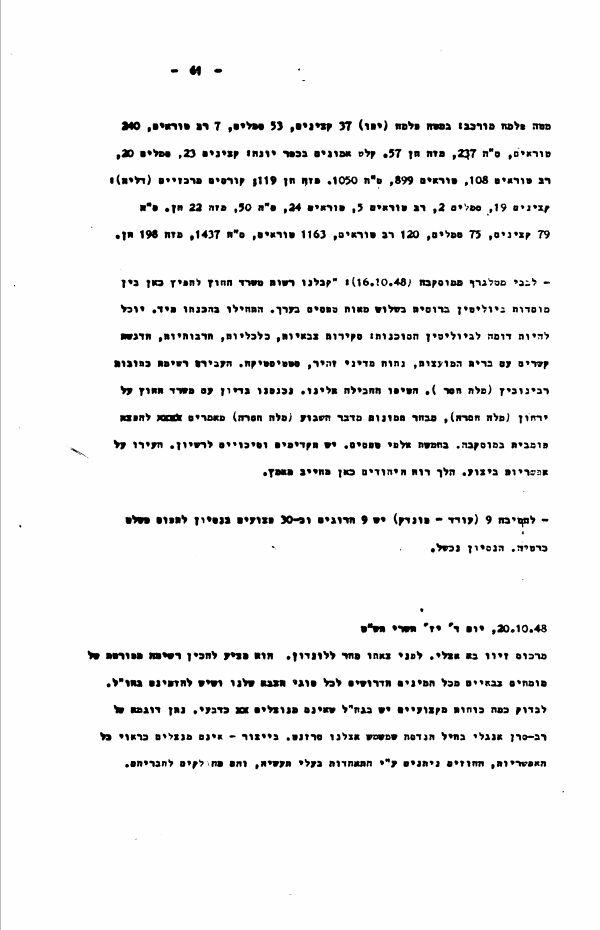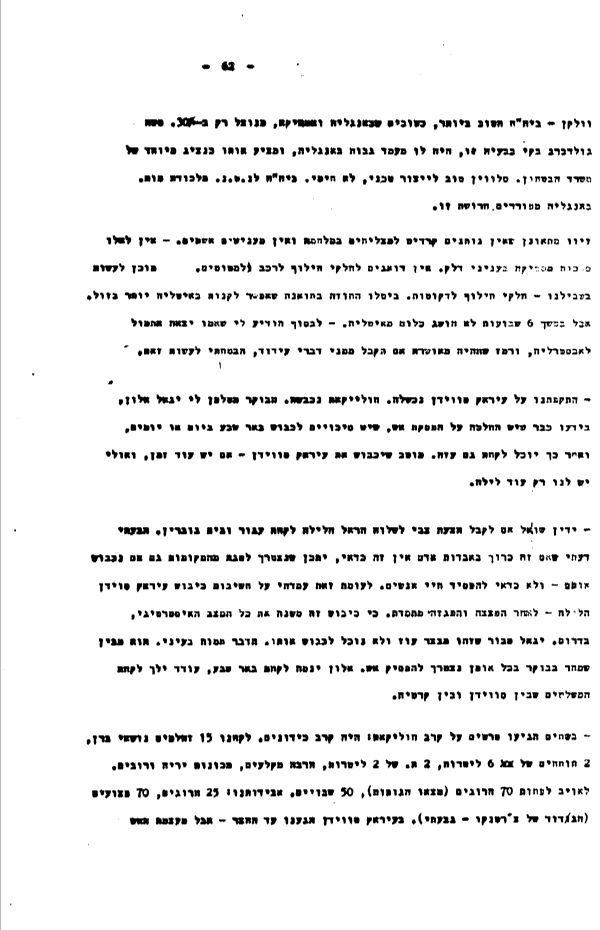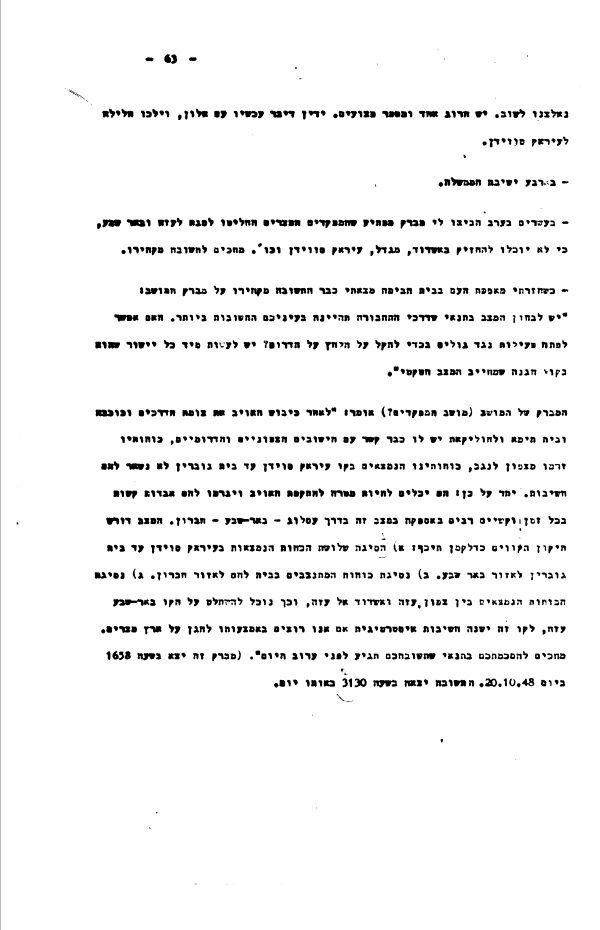1
of
Places:
Azor
England
London
United States
Ashdod
Be'er Sheva
Bet Guvrin
Har'el
Gaza
Agur
Barak
Giv'ati
Bir Asluj
Migdal
Cairo
Hebron
Bethlehem
Egypt
Hulayqat
Karatiyya
Ajjur
Julis
Kawkaba
People:
The use of the photograph is subject to the Copyright Law, 2007
19.10.1948
224890
Wednesday, October 20, 1948 Marcus Sieff came to see me, before leaving for London tomorrow. He proposes preparing a detailed list of military experts of all the sorts needed, for all the types of our military, and they should be invited from abroad. [We should] examine how many professional forces there are in GAHAL [foreign recruitment, but this should be: MAHAL, enlisted volunteers from abroad] that aren’t being fully exploited. He gave the example of an English major in the Engineering Corps who’s serving as a sergeant in production for us. [They’re] not properly exploiting all the possibilities, contracts are being provided by the Manufacturers’ Association, and they’re being allocated to their friends. Vulcan – the best factory, on par with the good ones in England and America, is only being exploited at 30% [capacity]. Sasha Goldberg is well-versed in this problem, he was high-ranking in England, and he proposes him as a special representative of the Ministry of Defense. [Haim] Slavin is suited for technical production, not chemical. The NTG [nitroglycerin] factory is a death trap. In England they break this factory apart [distribute production across separate facilities]. Sieff complains that [we] are aren’t giving credit [encouragement] to those who are successful in the war, and aren’t punishing the guilty. Eli [Kirschner] doesn’t have enough authority in matters of fuel. There’s no concern for spare parts for vehicles and airplanes. KLM [the Dutch airline company] is prepared to make spare parts for Dakotas for us. They canceled the contract on the pretext that [these] can be bought more cheaply in Italy. But in six weeks nothing has been obtained from Italy. Finally [Sieff] informed me that his mother [Rebecca, international president of the Women’s International Zionist Organization] left for Australia yesterday, and he hinted that she would be happy to receive words of encouragement from me. I promised to do this. – Our attack on Iraq-Suweidan failed. Hulayqat was captured. This morning Yigal Allon telephones me, knowing that there’s already been a [Security Council] resolution on a ceasefire, [and says] that there’s a chance of capturing Beersheva in a day or two, and after that he can also take Gaza. Better he should capture Iraq-Suweidan – if there’s still time, and we might only have one more night. Yadin asks whether to accept Zvi [Ayalon]’s suggestion of sending Harel tonight to take 'Ajjur and Beit Jubrin [that is, to mobilize southward]. I expressed my opinion that if it depends on human losses, then it’s not advisable: it’s possible that [because of the truce] we’ll need to withdraw from places even if we’ve captured them – and we shouldn’t lose lives. In contrast, I insisted on the importance of capturing Iraq-Suweidan tonight – after bombing and continuous shelling, because such a conquest changes the entire strategic situation in the south. Yigael [Yadin] thinks that this is a mighty fortress and we won’t be able to capture it. This is puzzling to me. He understands that tomorrow morning in any event we’ll need to cease fire. Allon will try to take Beersheva, Oded will go to take the strongholds between Iraq-Suweidan and Karatiyya. At two the details about the Hulayqat battle arrived: it was a battle of bayonets. We took 15 Bren-carrier tracked vehicles, 2 6-pound cannons, 2 2-pound C. [cannons], many [light] machine guns, [heavy] machine guns, and rifles. For the enemy there were at least 70 killed (they found the bodies), 50 POWs. Our losses: 25 killed, 70 wounded (Tsertenko [Zvi Tsur]’s battalion – Givati). In Iraq-Suweidan we reached the courtyard – but had to return because of the intensity of fire. There was one killed and a number of wounded. Yadin spoke now [at 2 p.m.] with Allon, and tonight they’ll go to Iraq-Suweidan. – At four government meeting. – At 20 [8 p.m.] in the evening they brought me a surprising cable [saying] that the Egyptian commanders had decided to retreat to Gaza and Beersheva, because they couldn’t hold onto Ashdod, Majdal, Iraq-Suweidan, etc. [They’re] waiting for a reply from Cairo. – When I returned from the People’s Assembly at Beit HaBima, I already found the response from Cairo to the cable from the [commanders’] meeting: “It’s necessary to examine the situation, on the condition that you consider the transport routes to be the most important aspect. Is it possible to mobilize against Julis in order to ease the pressure on the south? It’s necessary immediately to make any adjustment to the defense lines necessitated by the tactical situation.” The cable from the meeting (commanders’ meeting?) said: “Since the enemy captured the crossroads [Givati Junction] and Kawkaba and Beit Tima and Hulayqat, it now has links with the northern and southern settlements. Its forces flowed from the north to the Negev, [and] our forces on the Iraq-Suweidan line to Beit Jubrin are no longer of importance. Moreover: they could be a target for enemy attack and they’ll have heavy losses inflicted on them at any time, and there are many problems with supplies under these circumstances along the ‘Isluj – Beersheva – Hebron route. The situation requires immediately repairing the lines as follows: A) Withdrawal of the three katibas [battalions] stationed from Iraq-Suweidan through Beit Jubrin to the Beersheva area. B) Withdrawal of the voluntary forces [the Muslim Brothers] from Beersheva to the Hebron area. C) Withdrawal of the forces stationed between northern Gaza and Ashdod to Gaza, and thus we’ll be able to take control of the Beersheva – Gaza line. This line is strategically important if we want to use it to defend Egypt. We await your agreement on the condition that your response arrive before the end of the day.” (This cable was sent at 1658 on October 20, 1948. The reply was sent at 2130 on the same day.)











